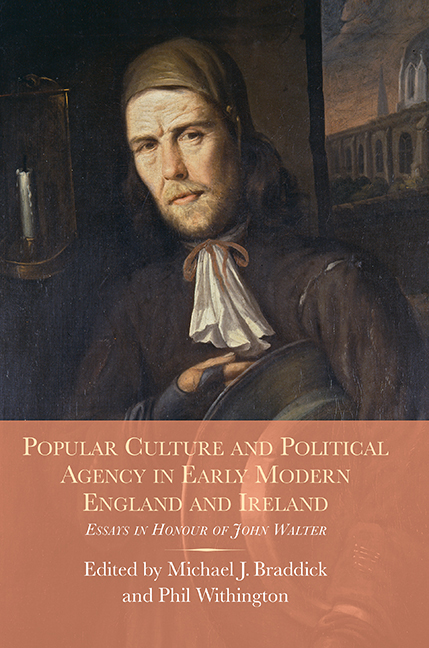 Popular Culture and Political Agency in Early Modern England and Ireland
Popular Culture and Political Agency in Early Modern England and Ireland Book contents
- Frontmatter
- Contents
- List of Illustrations
- List of Contributors
- Acknowledgements
- List of Abbreviations
- Introduction
- 1 John Walter and the social history of early modern England
- 2 Contrasting susceptibility to famine in early fourteenth- and late sixteenth-century England: the significance of late medieval rural social structural and village governmental changes
- 3 The politics of English political economy in the 1620s
- 4 Provision, household management and the moral authority of wives and mothers in early modern England
- 5 Popular senses of past time: dating events in the North Country, 1615–1631
- 6 Spectral lordship, popular memory and the boggart of Towneley Hall
- 7 Self-image and public image in the career of a Jacobean magistrate: Sir John Newdigate in the Court of Star Chamber
- 8 Gender, agency and religious change in early Stuart England
- 9 ‘A Standard which can never fail us’: the Golden Rule and the construction of a public transcript in early modern England
- 10 Religion, anti-popery and corruption
- 11 An ‘Aristotelian moment’: democracy in early modern England
- 12 John Lilburne and political agency in revolutionary England
- 13 An Irish Protestation? Oaths and the Confederation of Kilkenny
- 14 ‘Whereat his wife tooke great greef & died’: dying of sorrow and killing in anger in seventeenth-century Ireland
- Bibliography for John Walter
- Index
- Tabula Gratulatoria
- Miscellaneous Endmatter
7 - Self-image and public image in the career of a Jacobean magistrate: Sir John Newdigate in the Court of Star Chamber
Published online by Cambridge University Press: 09 May 2017
- Frontmatter
- Contents
- List of Illustrations
- List of Contributors
- Acknowledgements
- List of Abbreviations
- Introduction
- 1 John Walter and the social history of early modern England
- 2 Contrasting susceptibility to famine in early fourteenth- and late sixteenth-century England: the significance of late medieval rural social structural and village governmental changes
- 3 The politics of English political economy in the 1620s
- 4 Provision, household management and the moral authority of wives and mothers in early modern England
- 5 Popular senses of past time: dating events in the North Country, 1615–1631
- 6 Spectral lordship, popular memory and the boggart of Towneley Hall
- 7 Self-image and public image in the career of a Jacobean magistrate: Sir John Newdigate in the Court of Star Chamber
- 8 Gender, agency and religious change in early Stuart England
- 9 ‘A Standard which can never fail us’: the Golden Rule and the construction of a public transcript in early modern England
- 10 Religion, anti-popery and corruption
- 11 An ‘Aristotelian moment’: democracy in early modern England
- 12 John Lilburne and political agency in revolutionary England
- 13 An Irish Protestation? Oaths and the Confederation of Kilkenny
- 14 ‘Whereat his wife tooke great greef & died’: dying of sorrow and killing in anger in seventeenth-century Ireland
- Bibliography for John Walter
- Index
- Tabula Gratulatoria
- Miscellaneous Endmatter
Summary
Sir John Newdigate of Arbury, Warwickshire (1571–1610) has come to be regarded as the ideal type of ‘the public man’ in early Stuart England. Richard Cust's painstaking analysis of his commonplace books has demonstrated how Newdigate aspired to personify the conscientious magistrate fired with the zeal of civic duty. Newdigate's reading strategy arguably exemplifies the formation of the political culture of the provincial magistracy, revealing how the central themes of Renaissance political thought were internalised in the gentry parlour and on the sessions bench. Through the lens of Newdigate's early schooling and exhaustive programme of continuing education, Cust suggests, we can see how a common stock of aphorisms and examples helped inculcate the values of civic humanism – wisdom, incorruptibility, courage, love of justice, love of country and, above all, love of God – which were supposed to unite the gentry as a governing class.
Newdigate's lived experience as an active magistrate was, nonetheless, rather more controversial than this pious self-image suggests. During the very period when he was so assiduously ‘reading for magistracy’, Newdigate's personal and public roles as landlord and justice of the peace respectively brought him into conflict both with his own tenants and with the law officers of the crown. In June 1607, during the ‘commotion time’ of the Midland Rising (that series of anti-enclosure protests that convulsed the counties of Leicestershire, Northamptonshire and Warwickshire) Newdigate suppressed a series of riots on his own estate at Arbury. In retaliation, his neighbours subjected him to an orchestrated campaign of harassment and intimidation, characterising him not as a defender of the commonwealth but as an enemy of the people. In May 1608, Newdigate accused six of these conspirators of seditious libel in the court of Star Chamber, only to find that he was, in turn, prosecuted on behalf of the crown in the very same court by Attorney General Sir Henry Hobart, who charged him with depopulating enclosure. By unpacking the narrative implicit in this tangled skein of litigation and reading it in the context of Newdigate's own views about how a conscientious magistrate should conduct himself, this chapter analyses the complex relationship between the actual experience and the public representation of magistracy in early seventeenth century England.
The Midland Rising remains one of the most significant, yet paradoxically least explored, episodes of popular protest in the historiography of early modern England.
- Type
- Chapter
- Information
- Popular Culture and Political Agency in Early Modern England and IrelandEssays in Honour of John Walter, pp. 123 - 144Publisher: Boydell & BrewerPrint publication year: 2017


